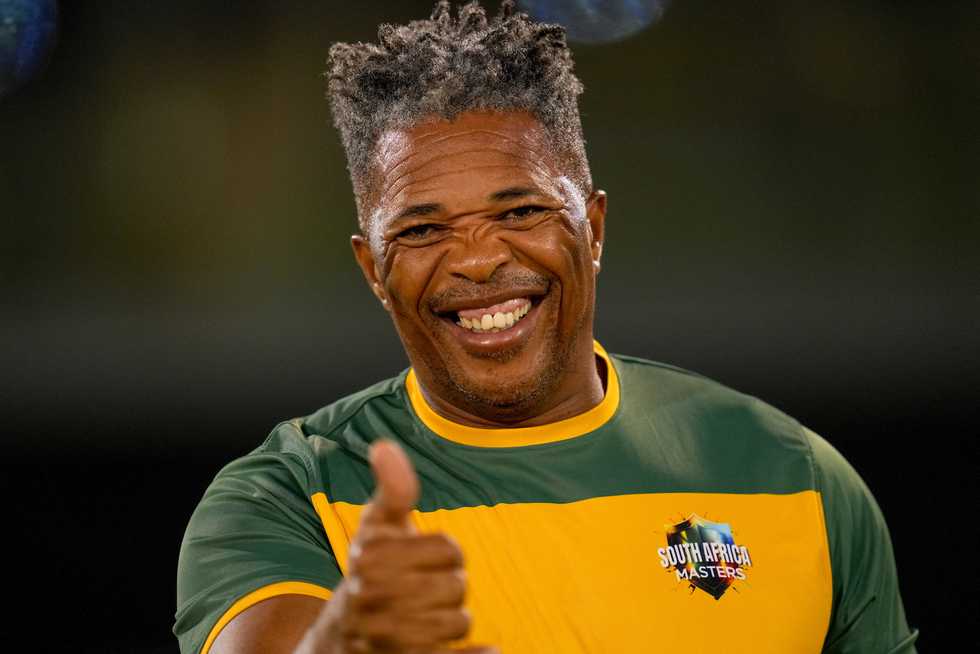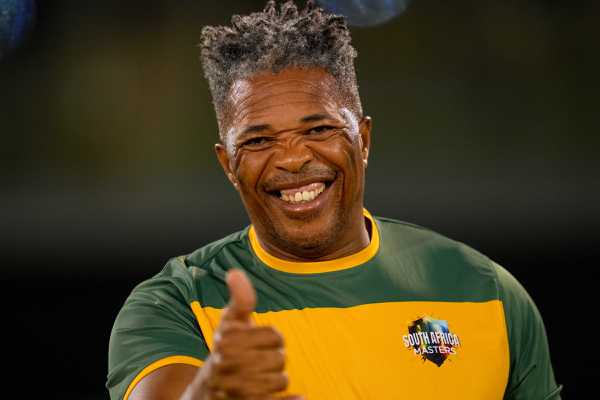
Ntini was South Africa’s first black international player, the key in the lock of a door that has yet to be fully opened. ©International Masters League
Makhaya Ntini’s hair is grey. His face is lined and leathery. His muscularity is not what it used to be when he was cricket’s most indefatigable fast bowler. He looks the opposite: fatigued. And older than his 48 years.
But he is still Ntini. Consequently, more than 14 years after he last played for South Africa, he is still being thanked.
“You did it for black people! That’s why we are here! Thank you for what you did for us! We know what you did for us! My mom watched cricket because of you! I started playing because of you! You made the legacy! Thank you! We love you!”
The words tumble torrentially, as do tears, from a woman who doesn’t seem old enough to know who Ntini was and is. But she knows something more important: that Makhaya Ntini will always be Makhaya Ntini, and that the idea of him will never die.
What does the woman’s gratitude and joy mean to him?
His eyes, always agleam, are suddenly soft. His voice, a ready, raucous rasp, is velvety, viscerally vulnerable.
“It means a lot,” he tells Cricbuzz. “It means I opened the path.”
Ntini isn’t easily subdued. He has been a force of nature and a blaze of spirit for all his waking life. But the question of what it means to him to mean so much to his compatriots seems to stop him in mid-blaze, as if it has never been asked of him – which would be bizarre considering he has and will have thousands of similar experiences.
We are standing on a corner of the red carpet at CSA’s annual awards at Emperors Palace, a casino and hotel complex in Johannesburg. A dazzlingly dressed fuss of Gatsbyesque proportions bustles all around us. There is nowhere to hide from the garish glare.
But Ntini is abruptly as alone as he would have been when he was herding cattle on misty hillsides in the rural Eastern Cape more than 40 years ago. When he was not yet Makhaya Ntini. Or not yet the fast bowler we know. Or not yet the Makhaya Ntini we prefer him to be. When our idea of him had not yet formed.
He is a man of flesh, blood, bone, brain, heart and soul who knows better than anyone the role he is obliged to play in the public consciousness, complete with sonic booms and the biggest personality in any room he’s in.
Ntini was South Africa’s first black international player, the key in the lock of a door that has yet to be fully opened. Since his Test debut in March 1998, 104 men have played at that level for South Africa. Only 14 are black. Twenty-five are brown, but almost two-thirds – 62.5% – are white. And that in a country where the 2022 census recorded that 81.7% of the population is black and 7.3% white.
Cricketers aren’t numbers. The last thing they want is to be picked – or not picked – because of the accident of the race they have been assigned. Even so, how much better would South Africa’s teams be if access to the game was more evenly spread? As it is, it remains a sport for the rich. And whites are grossly over-represented among the affluent because of the ongoing evils of centuries of institutionalised and systemic racism.
Soon after his talent was recognised, Ntini was plucked from the Eastern Cape’s misty hillsides as part of an overt attempt to right the wrongs of the past. Twenty-seven years after he made his debut, the wrongs are still with us. But they have been remedied, and Ntini knows it.
“The game of cricket is becoming bigger and bigger in South Africa,” he said, without referencing explicitly that he meant among black people. “Slowly but steadily it’s getting better.
“Just look where we are. We all know Emperors Palace is the home of boxing. That’s changed. Now it’s the home of cricket, and it’s wonderful.”
Although this was an exaggeration typical of Ntini in his guise of noisy national hero, he had a point. The casino has indeed hosted many of South Africa’s highest profile professional boxing fights. But it is just as true that the Eastern Cape has given South Africa many of its best boxers, most of them black. Now that same red carpet was being trod by cricketers, more of them black than previously.
Ntini wasn’t at that other place that likes to style itself as the home of cricket in June, when South Africa went there to beat Australia in the WTC final. Instead he was in a television studio analysing the match for his fellow South Africans. So he could feel the intense interest all around.
“I saw how many South Africans were at Lord’s; it was a home game for us,” he said. “But here at home so many people followed the match closely. That tells you that cricket in this country is not only loved by those who can afford to go to the stadium.”
Or who are invited to awards ceremonies. Ntini took a long moment to gaze on the madding crowd swirling around him, all designer smiles and bespoke laughs. He looked happy. Was he?
His eyes had regained their gleam. His voice was back to its raucous rasp. He was restored to our idea of Makhaya Ntini, and he boomed accordingly.
“Happy?! I’m over the moon!”
© Cricbuzz

